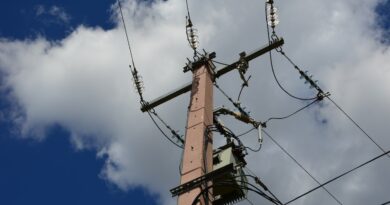Safety Matters: Raising Awareness about Electrical Safety Audits in Faridabad
Introduction
Electrical safety is of paramount importance in every aspect of our lives. Whether it’s at home, in the workplace, or in public spaces, ensuring electrical safety is crucial to prevent accidents, injuries, and even fatalities. In Faridabad, a bustling city in India, the need for comprehensive electrical safety audits is becoming increasingly evident. This article aims to shed light on the importance of electrical safety audits in Faridabad and raise awareness about the key aspects involved in ensuring a safe and secure electrical environment. So, let’s dive in and understand why safety matters!
Table of Contents
- Why Electrical Safety Audits Are Vital
- Understanding Electrical Safety Regulations in Faridabad
- The Process of Conducting an Electrical Safety Audit
- Identifying Potential Hazards and Risks
- Assessing Electrical Equipment and Systems
- Ensuring Compliance with Safety Standards
- Implementing Corrective Measures
- Training and Education for Electrical Safety
- The Role of Professionals in Electrical Safety Audits
- Benefits of Regular Electrical Safety Audits
- Case Studies: Successful Electrical Safety Audits in Faridabad
- Importance of Periodic Audits and Inspections
- Engaging Stakeholders in Electrical Safety Initiatives
- Creating a Culture of Electrical Safety
- Conclusion
1. Why Electrical Safety Audits Are Vital
Electrical safety audits play a crucial role in preventing electrical accidents and ensuring a safe environment. These audits help identify potential hazards, assess the condition of electrical equipment, and ensure compliance with safety regulations. By conducting regular safety audits, it becomes possible to address any issues promptly and implement corrective measures to prevent accidents and injuries.
2. Understanding Electrical Safety Regulations in Faridabad
In Faridabad, electrical safety is regulated by various laws and regulations. The primary legislation governing electrical safety is the Electricity Act, which outlines the requirements for safe electrical installations, maintenance, and inspections. Additionally, the National Electrical Code (NEC) and local building codes provide guidelines for electrical safety practices. It is essential for both individuals and organizations in Faridabad to familiarize themselves with these regulations to ensure compliance and avoid penalties.
3. The Process of Conducting an Electrical Safety Audit
A comprehensive electrical safety audit involves several steps to assess and mitigate potential risks. The process typically includes:
H1: Identifying Potential Hazards and Risks
The first step in an electrical safety audit is to identify potential hazards and risks. This includes examining electrical systems, wiring, equipment, and other components for any signs of wear, damage, or non-compliance with safety standards. Common hazards may include faulty wiring, overloaded circuits, inadequate grounding, and improper equipment installation.
H2: Assessing Electrical Equipment and Systems
Once potential hazards are identified, the next step is to assess the condition of electrical equipment and systems. This involves inspecting electrical panels, circuit breakers, switches, outlets, and other components to ensure they are in good working condition and meet safety requirements. Testing may also be conducted to check voltage levels, insulation resistance, and grounding effectiveness.
H3: Ensuring Compliance with Safety Standards
During the audit, it is crucial to verify compliance with safety standards and regulations. This includes checking if electrical installations adhere to the requirements specified in the Electricity Act, NEC, and local building codes. Any non-compliance issues should be documented and addressed promptly to ensure a safe electrical environment.
H4: Implementing Corrective Measures
If any hazards or non-compliance issues are identified during the audit, appropriate corrective measures must be implemented. This may involve repairing or replacing faulty equipment, improving wiring systems, upgrading safety features, or providing additional training to personnel. It is essential to follow industry best practices and guidelines while implementing these measures.
4. Training and Education for Electrical Safety
Promoting electrical safety goes beyond audits and inspections. It is crucial to provide training and education to individuals working with electrical systems or handling electrical equipment. Training programs can raise awareness about potential hazards, teach safe working practices, and ensure proper maintenance procedures. By empowering individuals with the knowledge and skills needed to identify and address electrical risks, the overall safety of Faridabad’s electrical infrastructure can be significantly improved.
5. The Role of Professionals in Electrical Safety Audits
Electrical safety audits require expertise and experience to be effective. Engaging professionals who specialize in electrical safety is highly recommended. These professionals have in-depth knowledge of electrical systems, regulations, and best practices. They can conduct thorough audits, identify potential risks, and provide expert recommendations for ensuring a safe electrical environment.
6. Benefits of Regular Electrical Safety Audits
Regular electrical safety audits offer numerous benefits to individuals, organizations, and the community as a whole. Some key advantages include:
- Prevention of electrical accidents and injuries
- Minimization of equipment downtime due to faults
- Enhanced compliance with safety regulations
- Identification and mitigation of potential risks
- Improved reliability and performance of electrical systems
- Cost savings by avoiding costly repairs or legal penalties
- Peace of mind for occupants and stakeholders
7. Case Studies: Successful Electrical Safety Audits in Faridabad
Several case studies highlight the positive impact of electrical safety audits in Faridabad. These audits have led to the identification and resolution of critical electrical issues, ensuring the safety of individuals and properties. Real-life examples serve as reminders of the importance of proactive safety measures and the potential consequences of neglecting electrical safety.
8. Importance of Periodic Audits and Inspections
Electrical safety audits should not be treated as one-time events. Periodic audits and inspections are essential to maintain the safety of electrical systems in the long term. Regular assessments help identify emerging risks, monitor the effectiveness of implemented measures, and ensure ongoing compliance with safety regulations. By incorporating audits into a comprehensive safety management program, the risk of electrical accidents can be significantly reduced.
9. Engaging Stakeholders in Electrical Safety Initiatives
Creating a culture of electrical safety requires the participation and cooperation of all stakeholders. It is essential to involve individuals, organizations, government agencies, and industry associations in promoting electrical safety initiatives. Collaboration among stakeholders can lead to the development of effective strategies, sharing of best practices, and increased awareness about the importance of electrical safety audits.
10. Creating a Culture of Electrical Safety
Beyond audits and inspections, it is vital to foster a culture of electrical safety in Faridabad. This can be achieved through continuous education, regular training programs, and ongoing awareness campaigns. By ingraining safe practices in daily routines, individuals can make a significant difference in preventing electrical accidents and creating a secure environment for everyone.
Conclusion
Safety should always be a top priority, especially when it comes to electrical systems. Raising awareness about electrical safety audits in Faridabad is crucial for the well-being of individuals, the smooth operation of businesses, and the overall development of the city. By understanding the importance of electrical safety audits, complying with regulations, and implementing preventive measures, Faridabad can become a safer place for everyone. Let’s prioritize electrical safety and work towards a future where accidents and injuries are minimized.




